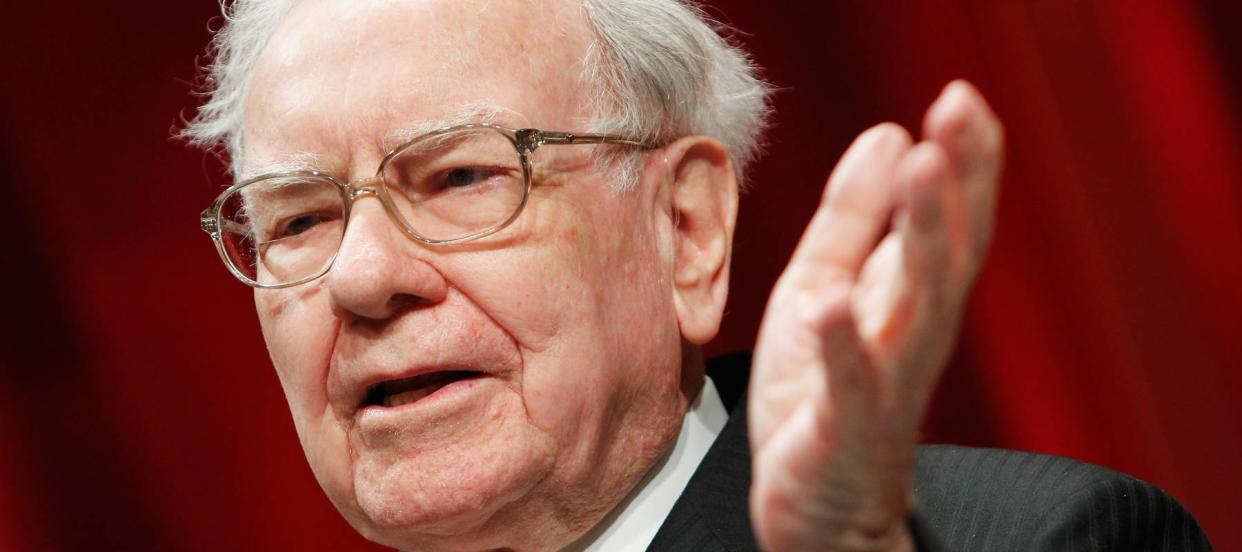'I killed the Dow': Warren Buffett shares how he would earn a whopping 50% per year if he had less than $1 million in 2024 — and how you can copy his plan

Investing legend Warren Buffett is renowned for generating oversized returns. From 1965 to 2023, his company Berkshire Hathaway has delivered compounded annual gains of 19.8%, substantially outperforming the S&P 500’s 10.2% annual return during the same period.
Today, Berkshire’s stock portfolio totals over $370 billion. However, Buffett believes that the massive size is actually a disadvantage and that he could achieve better results if he were managing smaller amounts of money.
Don't miss
Commercial real estate has beaten the stock market for 25 years — but only the super rich could buy in. Here's how even ordinary investors can become the landlord of Walmart, Whole Foods or Kroger
Cost-of-living in America is still out of control — use these 3 'real assets' to protect your wealth today, no matter what the US Fed does or says
These 5 magic money moves will boost you up America's net worth ladder in 2024 — and you can complete each step within minutes. Here's how
In 1999, he told Bloomberg Businessweek that “it’s a huge structural advantage not to have a lot of money.”
This perspective comes from personal experience.
“Anyone who says that size does not hurt investment performance is selling. The highest rates of return I've ever achieved were in the 1950s. I killed the Dow. You ought to see the numbers,” he said.
And he was confident that he could do it again, stating, “I think I could make you 50% a year on $1 million. No, I know I could. I guarantee that."
Twenty-five years later, that confidence hasn’t been shaken.
Read 20,000 pages
During this year’s Berkshire annual shareholders meeting, an audience member asked Buffett what method he would use to achieve that 50% annual return today starting with less than $1 million.
“The answer would be, in my particular case, it would be going through the 20,000 pages [of Moody's Manual],” Buffett said.
Moody's Manual was a series of publications by financial services company Moody's on publicly traded stocks. These texts provided detailed information on various industries, companies and securities.
“I found all kinds of interesting things when I was 20 or 21,” he said.
Read more: Jeff Bezos and Oprah Winfrey invest in this asset to keep their wealth safe — you may want to do the same in 2024
Buffett says he was able to acquire extensive knowledge of how different industries and companies functioned, even little-known ones, thanks to his dedicated research. He believes this type of behavior can provide an edge.
“I don’t know what the equivalent of Moody’s Manual or anything would be now, but I would try and know everything about everything small, and I would find something,” he said.
While the investing legend believes a 50% annual return is achievable, he acknowledges it requires more than just ambition.
“With $1 million, you could earn 50% a year, but you have to be in love with the subject. You can’t just be in love with the money,” he explained. “People find other things in other fields because they just love looking for them.”
Replicating success
Simply put, if Buffett had to start with $1 million today, he would arm himself with knowledge by going through today’s equivalent of Moody’s Manual in detail to find opportunities — including ones that may not be suitable for large funds.
You can still find these texts today — they are called Mergent Manuals. Mergent, Inc. acquired Moody's Financial Information Services division in 1998.
Investors today can also take advantage of tools and resources that didn't exist when Buffett first started investing, such as internet databases. Platforms like Yahoo Finance and Google Finance provide easy access to real-time stock quotes, financial news, historical data and comprehensive financial reports on thousands of companies across industries. Additionally, the EDGAR database from the U.S. Securities and Exchange Commission allows investors to access detailed filings and reports submitted by publicly traded companies.
However, keep in mind that Buffett's answer is what he would do, not necessarily what the average person should do. He considers investing to be his passion, and has previously expressed that stock picking is not an optimal strategy for average investors.
At Berkshire Hathaway's 2021 shareholders meeting, he stated, frankly, “I do not think the average person can pick stocks.”
Instead, he has repeatedly said that most people should invest their money in a low-cost, S&P 500 index fund.
In fact, he has included that recommendation into his will.
“One bequest provides that cash will be delivered to a trustee for my wife’s benefit,” he wrote in his 2013 letter to Berkshire shareholders. “My advice to the trustee could not be more simple: Put 10% of the cash in short-term government bonds and 90% in a very low-cost S&P 500 index fund.”
What to read next
Car insurance premiums in America are through the roof — and only getting worse. But 5 minutes could have you paying as little as $29/month
‘Baby boomers bust': Robert Kiyosaki warns that older Americans will get crushed in the 'biggest bubble in history' — 3 shockproof assets for instant insurance now
The 5 most expensive mistakes in options trading and how to avoid them
This article provides information only and should not be construed as advice. It is provided without warranty of any kind.
